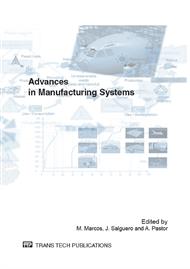p.73
p.79
p.85
p.91
p.97
p.103
p.109
p.115
p.121
Maturity Determination of New Forming Processes Considering Uncertain Indicator Values
Abstract:
The development of new forming processes primarily aims for increasing the process robustness and shortening the process chain. With the development of the novel Sheet-Bulk Metal Forming, cause-effect relationships are to be parameterized optimally and the economic efficiency of the manufacturing process is to be improved. The extensive and comprehensive development tasks often lead to an intransparent development status. Hence, operational and strategic decisions - particularly in the early development stages - are often made on the basis of subjective criteria and a high information uncertainty. This often results in wrong decisions as well as subsequent cost-intensive modifications in the design of expensive forming tools and forming machines. Based on a designed maturity method relevant indicators for the early maturity assessment and thus cost-reduced improvement of the development status of new forming processes are defined in this paper. The maturity here reflects the phase dependent development status. By providing a uniform basis of maturity indicators a comparable evaluation of the development status becomes enabled. The validity of the maturity assessment is enhanced by considering the information uncertainty by use of Fuzzy Logic. An exemplary maturity determination is performed within the development of the Sheet-Bulk Metal Forming.
Info:
Periodical:
Pages:
97-102
DOI:
Citation:
Online since:
February 2012
Authors:
Price:
Сopyright:
© 2012 Trans Tech Publications Ltd. All Rights Reserved
Share:
Citation:


